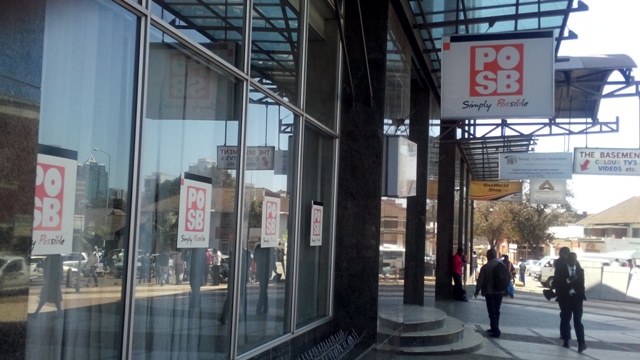


THE People’s Own Savings Bank (POSB) has slid into financial quandary after extending its loss position during the first half of 2014, but management counselled calm, saying the financial institution would not collapse. Israel Ndlovu, the company’s acting board chairman, said the banking institution’s woes had been precipitated by “extraordinary expenditure incurred in payment of taxes and penalties following an audit by the tax authorities”.
‘This apparently referred to raids by tax collector, the Zimbabwe Revenue Authority (ZIMRA), which has been aggressively hunting down tax defaulters and garnishing bank accounts of delinquent and defaulting companies as it seeks to raise funds for the cash-strapped government. Problems at POSB would have serious ramifications on depositors, particularly pensioners who receive their payouts through the bank, as well as low income earners and rural folk.
The bank provides banking services through 188 locations, by far the largest by any single banking institution in the country. Of these locations, 28 are POSB branches and 160 are the Zimpost agent network. POSB is the only savings bank in Zimbabwe, whose mandate is to mobilise savings and promote a savings culture through provision of accessible and affordable banking services to all Zimbabweans regardless of social standing or geographical location.
The extra-ordinary tax expenditure resulted in POSB’s loss position for the six months to June 30, 2014 worsening by 160 percent to US$340 288, from a loss of US$130 956 during the same period last year. Interest expenses increased to US$1 449 067, from US$1 295 032 during the same period last year, while impairment losses on financial assets also shot up to US$1 550 326, from US$1 360 114.
The bank’s balance sheet looks weak, with revenue reserves having slightly declined from US$6,2 million in December last year to US$5,9 million over the past six months, while total liabilities soared from US$77,5 million to US$89,5 million during the same comparative period. Net cash flows from operating activities went down from US$5,7 million in June 2013 to US$2,4 million during the period under review, while cash and cash equivalents also dropped from US$1,6 million to US$754 000.
POSB was unbundled from the liquidated Postal and Telecommunications Corporation (PTC), once a behemoth housing mobile telecommunications firm, NetOne, and fixed line telecommunications company, TelOne, and Zimpost, formerly the Post Office. POSB is wholly-owned by government. It was initially called the Post Office Savings Bank when it operated under the PTC using Post Office banking halls. There were plans to have the bank privatised a few years ago in a bid to boost viability.
In spite of its challenges, management said it had made an assessment of the bank’s ability to continue as a going concern and was satisfied POSB had the resources to continue in business for the foreseeable future. An 11 percent growth in total bank deposits to US$80,2 million, from US$72,1 million during the previous comparable period, failed to inspire POSB into profit. “The operating environment remains difficult as funding remains a challenge to the stability and financial security of the banking sector,” said Ndlovu.
“It is hoped that the intended capitalisation and resumption of the lender of the last resort by the Reserve Bank of Zimbabwe will ease the current liquidity challenges faced by some banks.” The financial institution however registered a 15 percent increase in the interest income to US$5,1 million from US$4,4 million while non-interest income went up 22 percent to US$9,3 million from US$7,6 million during the prior comparative period. Total assets also increased by 13 percent to US$101,5 million from US$89,9 million.
As part of growth efforts, POSB introduced micro finance loans as an addition to its existing loan portfolio. The bank also installed 10 Automated Teller Machines at various branches countrywide. “The bank will continue to introduce products in line with new technological developments so as to satisfy customers and remain competitive,” said Ndlovu.
“Internet banking is now at an advanced stage of being launched and it should further bring convenience to our customers. Re-alignment of costs, consolidation of market share and provision of more convenient as well as value-added services to all stakeholders are all sustainable efforts which the bank will continue to employ,” he said. – Mandla Tshuma
newsdesk@fingaz.co.zw